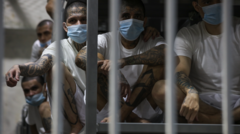El Salvador's President, Nayib Bukele, has put forward a controversial proposition to Venezuelan leader Nicolás Maduro, suggesting the repatriation of 252 Venezuelans deported by the United States in exchange for the release of an equivalent number of Venezuelan political prisoners. This exchange proposal was shared via Bukele's social media, prompting a mix of reactions.
Bukele accused the Venezuelan deportees of serious crimes, including rape and murder, while framing the political prisoners in Venezuela as victims of persecution due to their opposition to Maduro's rule, which has faced international scrutiny and accusations of electoral fraud.
The Venezuelan government swiftly responded through chief prosecutor Tarek William Saab, questioning the validity of Bukele's claims regarding the deportees' crimes. Saab demanded transparency about whether the deportees had faced legal processes or received due legal representation.
In his social media address, Bukele extended his offer further by mentioning nearly 50 additional inmates of various nationalities, including US citizens, advocating for a large-scale humanitarian agreement. Recent reports indicate that over 200 Venezuelan nationals have been deported from the US to El Salvador, as Washington accuses them of ties to the Tren de Aragua criminal group.
US financial support to El Salvador plays a role in managing these deported individuals, who are detained in the nation's infamous Terrorism Confinement Center. Bukele, who has gained notoriety for his stringent anti-gang measures, also provocatively refers to himself as "the world’s coolest dictator."
In reaction to the deportations, Maduro has condemned the US actions, labeling them as "kidnapping" and a severe infringement of human rights. Furthermore, legal complications surrounding mining immigration policies under the Trump administration have created roadblocks, with a recent US Supreme Court ruling temporarily halting the deportation of yet another group of alleged Venezuelan gang members.
Amidst the complexities of migration laws and human rights considerations, this proposed exchange raises critical questions regarding the nature of justice and accountability in both nations, as the world watches this unfolding geopolitical issue closely.

















